8 questions every DMP client asks
Our advisors are always just a phone call away to answer any...
I love my food. Love it. If my bathroom scales were blessed with the power of speech (as well as the power of lies…), they’d tell you the same. What I don’t love is food gone bad before its time. It makes me feel cheated, sad, and still hungry, which is obviously not the point!
When you’re cutting back on day to day costs, preventing food from spoiling too quickly is easier said than done. How do you know you’re storing it correctly? What’s better; room temperature or the arctic depths of the freezer? So many pitfalls!
Not to worry, help is at hand. Check out these easy-peasy ways you could prolong the lives of your perishables. If done properly, just a few small changes can add days, weeks, even months of longevity to your food.
(Always be sure to adhere to food safety guidelines when storing your food. Read this guide on how to store leftovers safely on the NHS website for more details)
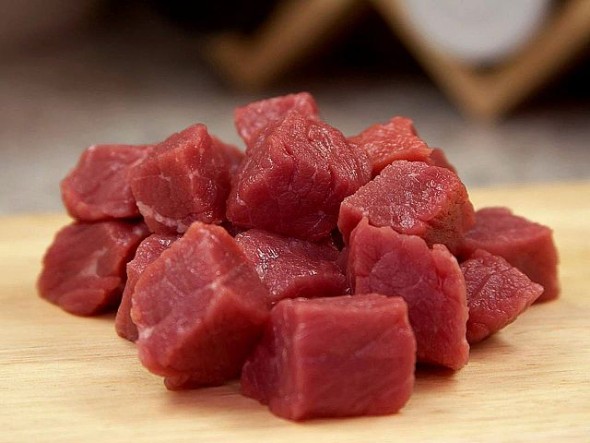 The most ideal way to store meat is to vacuum pack it, as this prevents decay-causing air from settling in. Now, I’m gonna assume you don’t have a vac-pack machine at home. There’s an easy way you can remove all the air surrounding the meat though, and it doesn’t involve sucking it out yourself (then again, meaty air sounds kinda appealing, right? Right?).
The most ideal way to store meat is to vacuum pack it, as this prevents decay-causing air from settling in. Now, I’m gonna assume you don’t have a vac-pack machine at home. There’s an easy way you can remove all the air surrounding the meat though, and it doesn’t involve sucking it out yourself (then again, meaty air sounds kinda appealing, right? Right?).
Wrap the meat in a zip-lock plastic bag, squeezing all of the air out. Zip it halfway and squeeze out as much remaining air as you can. Close the bag and then stick it in a second zip-lock bag, repeating the steps to make it as air-free as possible. Doing this also helps the meat keep longer in the fridge.
The easiest way to get the air out is to immerse the bag in water, keeping the ziplock opening out of the water. The water pressure should force out the last bits of air. Nifty, eh?
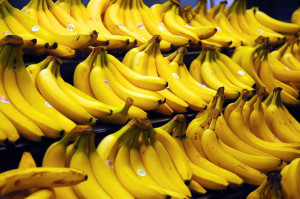 Ever reached into the fruit bowl for a lovely, firm banana only to touch a mushy, waxy-skinned mess? Not nice, is it? The good news is that it’s pretty easy to keep your bananas beautiful for longer.
Ever reached into the fruit bowl for a lovely, firm banana only to touch a mushy, waxy-skinned mess? Not nice, is it? The good news is that it’s pretty easy to keep your bananas beautiful for longer.
Next time you buy a bunch, simply cover the crown (where the bananas meet at the stem) in cling film. Doing this slows down the release of ethylene from the stem, which causes the bananas to ripen. Separating the bunch and individually wrapping each banana will make them keep even longer.
What is it about potatoes growing sprouts as soon as you put them somewhere dark? It’s like they can’t help themselves. No, you dumb spuds, you haven’t been planted in soil. You’ve just been shoved out of sight until you’re actually needed, like pancake mix or Great Uncle Norman.
Apparently, sticking an apple in with your potatoes could drastically slow down their sprouting. Who knows how. Maybe the apple bullies them, who can say?
Cheese can go cruddy after only a couple of short days in the fridge. Wrapping it in wax paper can keep it tastier for longer. You can pick up around 20 metres of wax paper fairly cheaply in most supermarkets. It keeps the cheese chilled without letting in excess moisture or odours from the other food occupying the fridge.
Bonus tip: rubbing butter on the edges of hard cheeses can also prevent it from drying out. You can also freeze cheese!
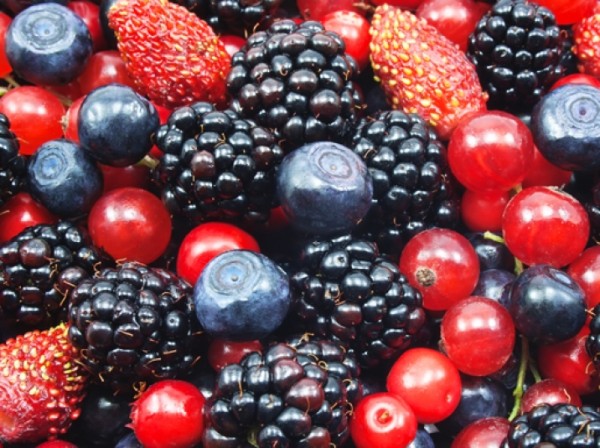 Wimbledon will soon be upon us, and that means sunny afternoons with strawberries and cream! Even if tennis isn’t your cup of tea, strawberries still make a sweet and healthy summer snack.
Wimbledon will soon be upon us, and that means sunny afternoons with strawberries and cream! Even if tennis isn’t your cup of tea, strawberries still make a sweet and healthy summer snack.
When you pick up a punnet of strawberries, always check for any mould spots before buying. Once you get home, fill a large bowl halfway with one-part vinegar and three-parts water and plop the strawberries in, sifting them through the solution by hand. The vinegar acts as a natural disinfectant and mould killer.
After a minute or two, give the strawbs a good rinse then pat dry thoroughly with a paper towel. Pop the strawberries into a plastic container with a layer of paper towel at the bottom to catch any excess moisture. This tip works for your blueberries and raspberries too!
The best way to keep herbs fresh is to store them in whole bunches. First you need to wash them, then seal them in zip-lock bags before freezing them. Doing this should keep them at peak freshness for up to a month. When you are ready to use them, you’ll find they are actually easier to chop frozen.
If you’re a bit on the green-fingered side, you could always grow a little ‘herb garden’ on your windowsill, provided you get lots of sunlight. This guide from Community Table can walk you through it.
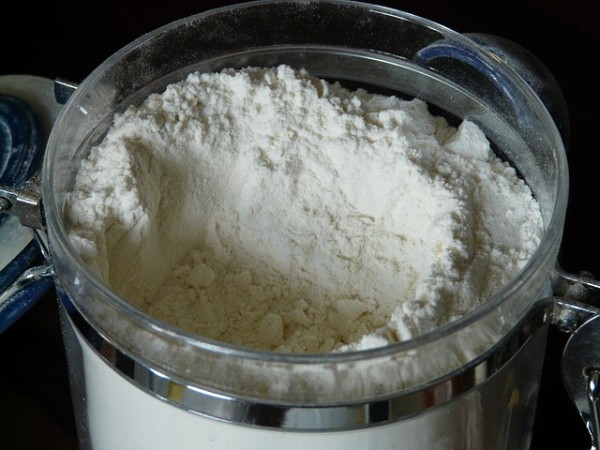 ‘Pantry pests’ such as weevils love to lay their eggs in baking flour, usually finding their way in well before the packets hit the shop floor. When they hatch, weevils and their ilk can quickly become the larder tenants from hell, devouring anything they can get their grubby little pincers around. Yeuch! (If you’re in the mood to be completely grossed out, a guide to help you identify pantry pests can be found on the Rentokil website)
‘Pantry pests’ such as weevils love to lay their eggs in baking flour, usually finding their way in well before the packets hit the shop floor. When they hatch, weevils and their ilk can quickly become the larder tenants from hell, devouring anything they can get their grubby little pincers around. Yeuch! (If you’re in the mood to be completely grossed out, a guide to help you identify pantry pests can be found on the Rentokil website)
Next time you pick up a bag of flour, pour it into a freezer bag and then bung it into the freezer for 48 hours. Any unwanted guests and their eggs will die off under those icy temperatures. For added peace of mind, you can sieve the flour and continue to store it in the freezer until next time you need it.
Keep milk in the main part of the fridge compartment if you have the space. When milk is stored in the door rack it’s warmed by the warm air of the kitchen whenever you open the fridge door. You can also freeze your milk in an ice cube tray to add to milkshakes and hot drinks.
Ah, lemons. Fragrant, fresh and full of vitamin C, they make a smashing addition to fruit salads, cold drinks and fish dishes. They can be awfully wasteful however. Cutting a lemon open can swiftly turn it into a withered eyesore.
If you need a dash of lemon juice but don’t want to waste the fruit, simply skewer the lemon with a fork prong instead of slicing it. Give it a squeeze, and you can get a fair few drops of juice and still have the rest of your lemon for later.
Speaking of the humble fish, the best way to store it if you plan on eating it soon is to bag it up and lay it on a bowl of ice in the fridge. You can also freeze fish or grill it and store in the fridge. Making fish a more frequent feature of your diet can be good for your health and your budget. If you’re hankering for some maritime morsels, Check out these yummy seafood recipes from Fish is The Dish!
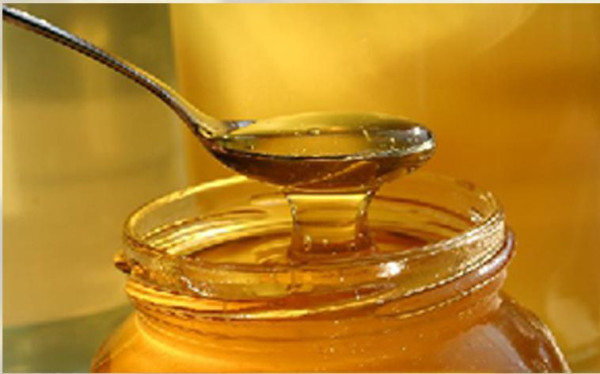 Not so fast, Winnie the Pooh! Don’t go chucking out that crusty jar of honey so quickly. It never goes off, not ever. No doubt you’ve heard of the ancient egyptian honey that was still edible 3,000 years later. If old honey’s good enough for King Tut, it’s good enough for you!
Not so fast, Winnie the Pooh! Don’t go chucking out that crusty jar of honey so quickly. It never goes off, not ever. No doubt you’ve heard of the ancient egyptian honey that was still edible 3,000 years later. If old honey’s good enough for King Tut, it’s good enough for you!
A 30-second stint in the microwave should make honey clear again, just make sure you take off the metal jar top first. You can also melt the honey by standing the jar in a bowl of hot water for the same amount of time.
Tomatoes can swiftly turn grim if you’re not storing them properly. Some speculate this is because the stem hole on a tomato is an easy entry point for mould and bacteria. I speculate it’s because they’re jerks, but that’s just me…
To get an extra week out of tomatoes, store them stem-side down on the countertop, as refrigerating tends to strip them of their delicious flavour. If you don’t have counter space, sticking a strip of sticky tape over the stem hole works too.
 Eggs are a food budget’s best friend. They’re easy to cook, are a key ingredient in lots of recipes, and they’re cheap! They’ve also got a hint of nostalgia to them. One of my favourite brekkies is egg and toast soldiers, which for me is a pure slice of childhood!
Eggs are a food budget’s best friend. They’re easy to cook, are a key ingredient in lots of recipes, and they’re cheap! They’ve also got a hint of nostalgia to them. One of my favourite brekkies is egg and toast soldiers, which for me is a pure slice of childhood!
The best way to store eggs is in the fridge, in their original carton. Like milk, the worst place to store eggs is the fridge door shelves due to warm air whooshing in every time the fridge is opened.
If you want to test an egg’s freshness, plop it in a cup of water: Fresh eggs will sink while bad ones float.
I’d give my kingdom for a bag of lettuce that doesn’t rot within about five minutes of me buying it! You try and be healthy and swear to eat salads from now on, then you open the salad drawer to something that looks like it’s been skimmed from a garden pond.
To keep your lettuce fresh, wrap it in damp paper towels and store in a plastic bag. This keeps excess moisture from turning it into a soggy, compost-smelling nightmare. Before fixing a salad, rinse your lettuce leaves in ice water to crisp them up again.
 These crunchy veggies are always good to have in plenty supply. Celery and radishes give extra crunch to your salad, and carrots, well…healthy alternative to tortilla chips for dipping into hummus, anyone? Not to mention carrot cake!
These crunchy veggies are always good to have in plenty supply. Celery and radishes give extra crunch to your salad, and carrots, well…healthy alternative to tortilla chips for dipping into hummus, anyone? Not to mention carrot cake!
To keep your crudites crunchy all day every day, chop them and store them in water in the fridge. Always remove the green stemmy bits from your carrots, as they can leech all the nutrients from them. Greedy!
If you don’t have room in your fridge for a bowl of water, try placing them in the vegetable drawer on a thick layer of absorbent kitchen paper.
Many people make the mistake of storing garlic in the refrigerator. Doing this causes the bulb to deteriorate, not to mention that everything from the fridge will taste of garlic for the next couple of weeks.
Garlic doesn’t do well in the freezer either, and storing it in plastic containers is worse still. Talk about awkward!
The best way to store garlic is in a wire basket, a small bowl with ventilation holes or even a paper bag. You could also hang it from the ceiling, but then any visiting relatives might think you’re expecting vampires and stop coming over (ceiling garlic it is!).
To revive day-old muffins, sprinkle them with water, place in a paper bag, and pop in a hot oven for five to 10 minutes. The steam created by the water will restore moisture.
It won’t make the calories evaporate, though. Soz about that.